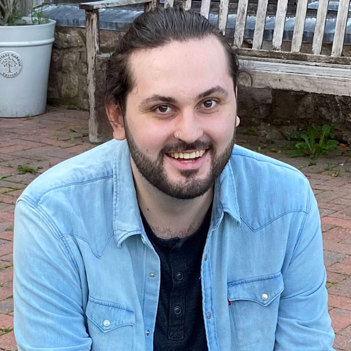Cautiously looking towards a brighter future: Hal's story
22/07/2022

Hal first started to experience the symptoms of schizophrenia when he was in his teens, yet despite a difficult journey with his medication, with the right mental and physical support, his dark days are receding, and he has a brighter future ahead. Hal explains:
It’s an odd one really, how life just sort of happens before your eyes and suddenly the world changes. When I was 16, I was voluntarily admitted to an adolescent psychiatric ward for what would be diagnosed as ‘extreme’ obsessive-compulsive disorder (OCD); it was so extreme I was not wanting to go on. I began intensive treatment with an excellent psychologist and whilst my OCD perpetuated, things got worse: I started to hear voices.
"I didn’t expect it. I doubt anyone would. It was a long 18 months or so, in which my intensive therapy for OCD began to change my life but simultaneously, the voices got worse. I began to believe that I was the reincarnation of Joseph Stalin, and my older brother was Hitler. Voices would whisper to me and shout at me. They were so venomous, insidious, unfailing, unending."
When I turned 18, I had reached a sort of remission for my OCD, thanks largely to the fantastic therapy at the Maudsley Hospital in London and with my Children & Adolescent Mental Health Services (CAMHS) team. However, my psychosis led me to being sectioned in first few months of 2016. I was diagnosed with paranoid schizophrenia. I was actually very lucky that I had a psychiatrist who spotted me as treatment-resistant early on. I began an antipsychotic drug, which for me (who’s been on it twice), has changed my life.
However, first time around, I didn’t respond totally to the antipsychotic medication and had some cardiac issues, which led to a new psychiatrist (whom I had never met) taking me off the medication totally, rather than trying a higher dose. This was catastrophic. Whilst I have - now at least - no doubt that the new doctor didn’t mean to harm me, I had an awful relapse and wound up under section again primarily because of this.
There was some discussion, at this time, that I may have a personality disorder. Unfortunately, this is a period I largely don’t remember. I was placed on a high-dose sedative - of which I am now highly critical. There’s a role for the short-term use of these, of course, but my maximum dosage was excessive and negligent of the prescriber. I feel like at this time, they just wanted to shut me up. I passionately believe that the psychiatric establishment overprescribes psychoactive sedatives in particular; I found they didn’t do anything positive at all; they just numbed me.
It was a tricky year, and I tried to move to London to study, which, whilst at first felt like the right idea, by the time we returned for spring term, I was really very unwell. I dropped out, and not long after, I was sectioned again.
"The hospital near my home in Shrewsbury was truly exceptional. They listened, and they cared and took into account all of my problems. Under consultation with a cardiologist, I restarted my antipsychotic to a higher dose, and my life has improved so much."
Whilst I returned to London soon after my discharge, I had to drop out again to get everything right. So, I went home, engaged with my mental health team and built a strong arsenal of tools for the fight. My team shuffled my meds and talked to me at length - sometimes just about the latest Marvel movie. I even got off the sedative.
I’m now returning to London to make studying easier, which, at one point seemed impossible. Without the unwavering support of my family, my team and my meds regime, I would be in a bad way indeed. Instead, I cautiously but proudly say “recovery is possible”.
National Schizophrenia Awareness Day on 25 July shines a light on the everyday challenges faced by hundreds of thousands of people living with a diagnosis of schizophrenia in the UK and millions more worldwide. You can help us make a difference by sharing our content on Facebook and Twitter.
